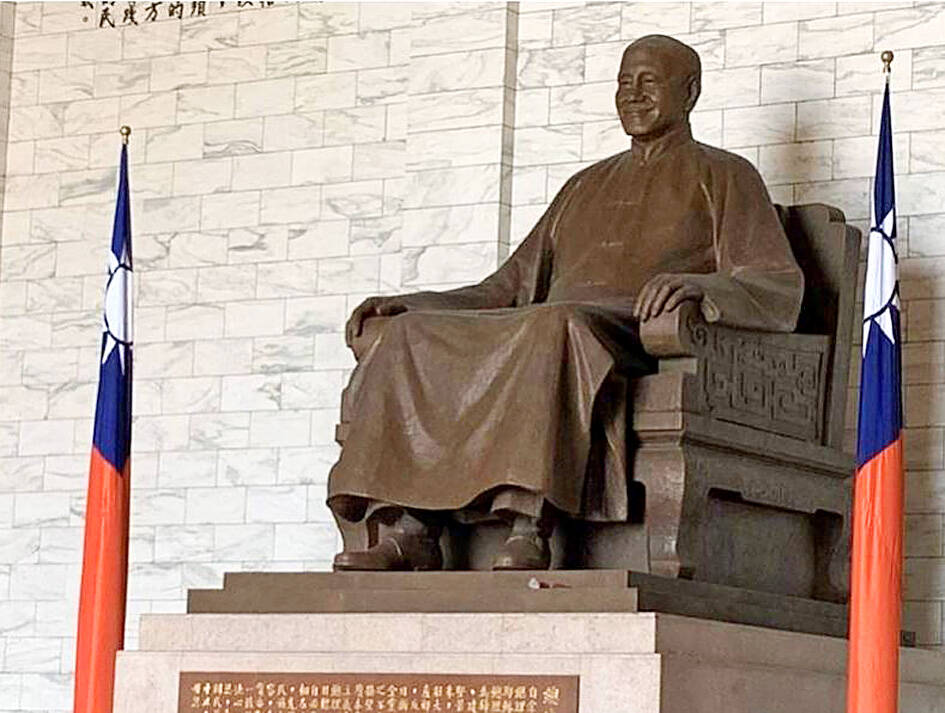Transitional justice is not possible while authoritarian-era symbols glorifying former presidents Chiang Kai-shek (蔣介石) and his son Chiang Ching-kuo (蔣經國) remain, many survivors and families of people persecuted in the 228 Incident said.
Today marked the 76th anniversary of the incident, a crackdown launched by the then-Chinese Nationalist Party (KMT) regime against civilian demonstrators following the killing of a bystander in a crowd in Taipei on Feb. 27, 1947.
Between 18,000 and 28,000 people were killed during the crackdown, which lasted into early May 1947, a government report released in 1992 showed.

Photo copied by Wang Kuan-jen, Taipei Times
It marked the beginning of the White Terror era in Taiwan, during which thousands of people were arrested, imprisoned or executed.
“Chiang Kai-shek was the prime culprit of the 228 Incident. He has massive amounts of blood on his hands,” Taiwan 228 Care Association chairman Wang Wen-hong (王文宏) said.
Despite Chiang Kai-shek’s record of brutality, a large statue of him stands in the chamber of the Chiang Kai-shek Memorial Hall, Wang said, which he described as “condescending.”
Then-governor-general Chen Yi (陳儀) on March 2, 1947, agreed to requests from local leaders to establish the 228 Incident Settlement Committee to investigate the Feb. 27 incident.
However, on March 6, hundreds of people heading to a meeting of the committee in Kaohsiung were fired upon, under the orders of the Kaohsiung garrison commander, major-general Peng Meng-chi (彭孟緝).
Wang’s father, Wang Ping-shui (王平水), was among those killed in Kaohsiung, historical records showed.
Wang Wen-hong was 32 days old at the time.
Over the next two decades, he grew up under an authoritarian KMT regime that did not teach children about the 228 Incident, and created an atmosphere of fear to keep people quiet about it.
In a high school essay about his father, Wang Wen-hong wrote that “my father was killed by bad guys in the 228 Incident,” which he learned from hearing relatives talk about it, without understanding what it was.
The essay terrified his mother, he said.
“She quickly threw a banquet for my teachers to apologize for my ‘innocence’ and bought a boat ticket to send me to Brazil,” he said. “She was worried the essay would get me into trouble if I were conscripted into the army.”
In Brazil, he learned that his brother, who was 14 years older than him, and their grandfather found their father’s body among a pile of corpses in a cattle trailer after a long search on the chilly, rainy evening of March 10.
He said they bribed KMT soldiers to bring the body home.
Wang Wen-hong returned to Taiwan after the term “transitional justice” was first codified into law in August 2016.
Wiping out the legacy of authoritarianism was also mandated by the Act for Promoting Transitional Justice (促進轉型正義條例), enacted in 2017.
Wang Wen-hong said that transitional justice would not be complete without dealing with the symbols of Taiwan’s authoritarian past, including the Chiang Kai-shek Memorial Hall and Cihu Mausoleum in Taoyuan’s Dasi District (大溪), where Chiang Kai-shek and Chiang Ching-kuo are interred.
Historical archives indicate that Chiang Kai-shek, who was in Nanjing, China, at the time of the 228 Massacre, ordered Chen to respond to the uprisings with a brutal crackdown, and sent troops from the mainland to quell the protests, said Kenneth Wang (王克雄), whose father, Wang Yu-lin (王育霖), was arrested on March 14 and later executed.
Those who opposed the removal of these symbols are unwilling to face history and admit to the mistakes made in the past, Kenneth Wang said.
He said he hopes that President Tsai Ing-wen (蔡英文) will keep her promises on transitional justice and that the KMT will have the courage to admit what it did so it can apologize with sincerity.
“Only by doing so can the historical trauma be healed and forgiveness and social reconciliation come about,” he said.
Eliminating the symbols could still be difficult. When the ad hoc Transitional Justice Commission was formed, there were about 966 statues of Chiang Kai-shek or Chiang Ching-kuo in public spaces and 580 places named after them nationwide, government data showed.
When the commission was dissolved in May last year, 80 percent of those symbols remained, the data showed.

Actor Darren Wang (王大陸) was questioned by prosecutors for allegedly orchestrating an attack on a taxi driver after he was allegedly driven on a longer than necessary route in a car he disliked. The questioning at the New Taipei City District Prosecutors’ Office was ongoing as of press time last night. Police have recommended charges of attempted murder. The legally embattled actor — known for his role in the coming-of-age film Our Times (我的少女時代) — is under a separate investigation for allegedly using fake medical documents to evade mandatory military service. According to local media reports, police said Wang earlier last year ordered a

CAUTION: Based on intelligence from the nation’s security agencies, MOFA has cautioned Taiwanese travelers about heightened safety risks in China-friendly countries The Ministry of Foreign Affairs (MOFA) yesterday urged Taiwanese to be aware of their safety when traveling abroad, especially in countries that are friendly to China. China in June last year issued 22 guidelines that allow its courts to try in absentia and sentence to death so-called “diehard” Taiwanese independence activists, even though Chinese courts have no jurisdiction in Taiwan. Late last month, a senior Chinese official gave closed-door instructions to state security units to implement the guidelines in countries friendly to China, a government memo and a senior Taiwan security official said, based on information gathered by Taiwan’s intelligence agency. The

President William Lai (賴清德) should protect Taiwan Semiconductor Manufacturing Co (TSMC), and stop supporting domestic strife and discord, former president Ma Ying-jeou (馬英九) wrote on Facebook yesterday. US President Donald Trump and TSMC on Monday jointly announced that the company would invest an additional US$100 billion over the next few years to expand its semiconductor manufacturing operations in the US. The TSMC plans have promoted concern in Taiwan that it would effectively lead to the chipmaking giant becoming Americanized. The Lai administration lacks tangible policies to address concerns that Taiwan might follow in Ukraine’s footsteps, Ma wrote. Instead, it seems to think it could

Taiwan Semiconductor Manufacturing Co (TSMC), the world’s largest contract chipmaker, said yesterday that it is looking to hire 8,000 people this year, at a time when the tech giant is expanding production capacity to maintain its lead over competitors. To attract talent, TSMC would launch a large-scale recruitment campaign on campuses across Taiwan, where a newly recruited engineer with a master’s degree could expect to receive an average salary of NT$2.2 million (US$60,912), which is much higher than the 2023 national average of NT$709,000 for those in the same category, according to government statistics. TSMC, which accounted for more than 60 percent